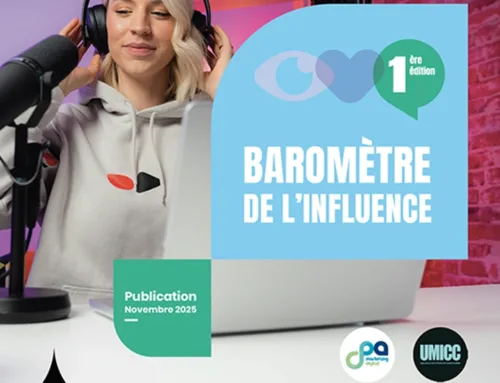And that’s it! The draft law aimed at regulating commercial influence and combating the abuses of influencers on social networks was unanimously adopted by Parliament on June 1 and promulgated on June 9. Six months of consultation, with the participation of 19,000 citizens and 400 professionals, have resulted in the passage of a law that provides a framework and professionalizes the practice of influence. This text has an impact on both sides of the screen. On the one hand, by guiding influencers, but also influencer agents and platforms, towards responsible practices, and on the other, by protecting consumers against dubious practices. Here’s what you need to know.
If you’d like to get an overview of the influence market in France, take a look at our article on the Influence Barometer, which details key figures, sector analyses, etc.
Two definitions and a contract to frame the debate
One of the aims of the law is to remove the vagueness surrounding influence and its ecosystem. The aim is to define everyone’s role and provide a framework for relationships.
Definition of an influencer
An influencer is any natural or legal person who, for a fee, mobilizes his or her reputation among his or her audience to communicate content to the public electronically, promoting, directly or indirectly, any goods, services or causes whatsoever.
(ed. note: while we agree with this definition, at Effinity we take a slightly less legal view. For us, influencers are people who have a passion and want to share it. And influencer marketing makes it possible to monetize their content, when they spend time introducing their community to a product or brand linked to this passion).
Definition of an influencer
The activity of influencer agent consists, for a fee, in representing natural or legal persons exercising the activity of influencer defined in the law, to natural or legal persons and, where applicable, their representatives, requesting their services, with the aim of promoting, by electronic means, goods, services or any cause whatsoever.
The influence contract
Influencers, their agents and/or the advertiser must draw up a contract if the value of the services, whatever their form, exceeds a threshold (to be set by decree). This contract must include :
- clear presentation of the parties to the contract
- the commitments of each party
- (what is expected, rights to exploit content, etc.).
- the remuneration or value of the benefit in kind
- contract duration
- the law applicable to the contract will necessarily be French law
Influencers based abroad who address a French audience must appoint a legal or natural person in France to ensure that their contracts comply with French law. They are also required to take out professional indemnity insurance in the European Union.
Best practices for a responsible influence
Transparency obligations
Influencers will have to be very transparent in the creation of their content.
- for content that receives compensation for its distribution (remuneration, product donation, travel, etc.), the words “advertising” or “commercial collaboration” must be clearly, legibly and identifiably displayed on the publication for the duration of the promotion.
- photos and videos retouched (filters or other) to modify the silhouette or face must be clearly marked “Image(s) retouchée(s)”.
- photos, videos and representations of a silhouette or face created by artificial intelligence must indicate “Virtual image(s)”.
Prohibited products and services and regulated areas
Influencing these products and services is prohibited, as is advertising:
- counterfeit products
- tobacco, electronic cigarettes and nicotine products
- prescription drugs
- cosmetic surgery
- risky financial products
- subscriptions to sports tips and predictions
- wild animals
Influence is regulated in these areas, according to the laws in force in each field:
- digital assets (crypto-assets, etc.)
- games of chance and gambling
- alcoholic beverages
- medicines for human use
- medical devices
Support for the adoption of best practices
The law provides for the introduction of a “guide to good conduct” for influencers, including rules and best practices, the creation of “Assises de l’influence responsable” (responsible influence conferences) to be held annually at Bercy, and the promotion of responsible influence and all existing initiatives.
Controls and penalties
While the text of the law focuses primarily on promoting best practices, it also includes a repressive component. This includes the creation of a “brigade de l’influence commerciale” within the DGCCRF, which will be responsible for monitoring compliance with best practices. In addition, sanctions will be strengthened and graduated, with new prohibition penalties and injunctive powers for supervisory authorities. Not to mention that the advertiser, its agency/agent and the influencer are all jointly and severally liable in the event of non-compliance.
Effinity’s opinion
The adoption of the law on influence seems to us to be an excellent thing. Effinity, whoseinfluencer marketing agency is a member of the Union des métiers de l’influence et des créateurs de contenu (UMICC), played an active role in the preliminary consultations. This law provides a framework for a number of practices and helps to professionalize influencer marketing. Without, however, restricting the creativity of content creators. It also recognizes the growing importance of influence in advertisers’ marketing mixes.
For our Influence teams, this law won’t change the way they practice their trade. Effinity has been implementing these best practices (contracts with influencers and advertisers, not working in risky sectors, transparency, etc.) since 2015! It has to be said that we had a bit of experience, since we had previously contributed to the monetization of other creators’ content: personal pages since 2000, bloggers since 2005, and Youtubers since 2010.
Effinity also makes influencers aware of this ethical dimension, in particular by encouraging them to obtain the ARPP certificate of responsible influence.
So, to conclude, we can say that this law changes everything, since “the law of the jungle is over”, as Arthur Delaporte, one of the MPs who initiated the text, reminded us, and that this law changes nothing (or not much), for influencers, agencies and advertisers who have already placed responsibility and ethics at the heart of influencer marketing.




